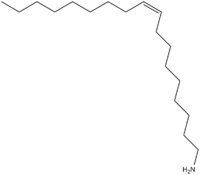Oleylamine
| Oleylamine[1] | |
|---|---|
 | |
| IUPAC name (Z)-Octa-9-decenylamine | |
| Other names 9-Octadecenylamine | |
| Identifiers | |
| CAS number | 112-90-3 |
| PubChem | 5356789 |
| ChemSpider | 4512354 |
| UNII | ZDQ1JWQ8DT |
| Properties | |
| Molecular formula | C18H37N |
| Molar mass | 267.49 g mol−1 |
| Appearance | Clear, slightly yellow liquid |
| Density | 0.813 g/cm3 |
| Melting point | 21 °C |
| Boiling point | 364 °C |
| Solubility in water | Insoluble |
| Hazards | |
| NFPA 704 |
 0
3
0
|
| Flash point | 154 °C; 309 °F; 427 K |
| Except where noted otherwise, data are given for materials in their standard state (at 25 °C (77 °F), 100 kPa) | |
| Infobox references | |
Oleylamine is a primary amine of the alkene (''Z'')-Octa-9-decene and similar in structure to the fatty acid oleic acid. It is a common reagent in the chemical synthesis of nanoparticles. It can function both as a solvent for the reaction mixture and as a coordinating agent to stabilize the surface of the particles. Most commercially available oleylamine is technical grade, with only 70% purity.[2] This high level of impurity makes the reaction conditions with oleylamine difficult to reproduce and standardize.
Oleylamine has an LD50 Intraperitoneal of 888 mg/kg in mice. It is highly corrosive and readily causes skin burns. Appropriate personal protective equipment is recommended at all times while using this chemical.[2]
See also
References
- ↑ Oleylamine at chemicaldictionary.org
- ↑ 2.0 2.1 Technical grade Oleylamine on Sigma-Aldrich